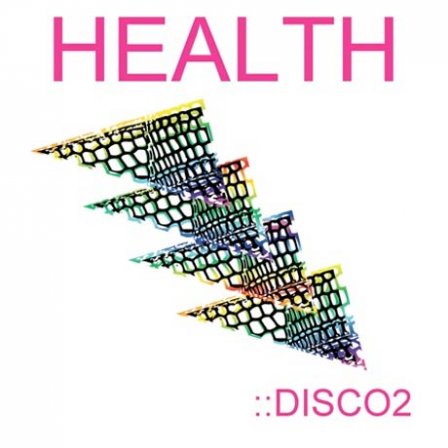HEALTH’s self-titled debut, despite its brief running time, was a punishingly difficult listen. It wasn’t just the blasts of noise; it was the structures. Noise tends to cloak anarchy, but despite HEALTH’s atonal din, the band’s music is never formless or chaotic. Their structures are strong, often to the point of severity, resembling diagrams or schematics more than the gentle sense of flow that usually guides songwriting. Their architecture is full of angles and sharp edges. If you aren’t careful wandering through the tracks on HEALTH, you could hurt yourself.
2009’s Get Color represented a significant development for the band. Although they sacrificed none of their aesthetic violence, the shift from HEALTH shed new light on the groove-oriented elements of their sound. It made Disco, their sophomore release from 2008, seem like less of a surprise, in retrospect. It was easy to hear the influence of the dancefloor in the bottom-heavy drum grooves and dogged repetitiveness that drove Get Color’s “Die Slow” and “We Are Water.” And those features didn’t rest only on the surface, either; they’re a well-developed, deep-rooted trait.
So the question with DISCO2, a collection of remixes, is about how to bring a more rhythmic awareness to songs that are already aware of their power to move bodies, how to inject them with a new kind of strength when they were already lifting so much. The first single, “USA Boys,” seems to complicate the matter instead of providing an answer. It isn’t even a remix, but instead is what HEALTH would sound like if they remixed themselves. It’s as bold and unblinking as anything they ever do, hitting you right in the face from the first brief, palate-cleansing wave of noise through the huge drum machines and Kevin Shields-esque vocals. On this record, the translation from rock to dance is anything but surprising; the surprise is the shift in mood. Get Color was less about HEALTH’s jagged geometry and more about them finding the groove in the heart of their own rebellious machinery. Accordingly, DISCO2 is less about context shock than its predecessor. In fact, it’s a little strange that a collection so clearly tailored for the dancefloor would be so lacking in shock and violence. It’s damn near peaceful.
The remixes vary in quality, but there are plenty of highlights. Javelin’s take on Get Color opener “In Heat” has a French sheen to it, turning what was the audio equivalent of a drive-by shooting into something catchy, with synth riffs that betray a sly sense of humor. Little Loud’s remix of “Nice Girls” buries pitch-shifted fragments of the original melody over a heavy, dense, and woozy house beat. Duzsik’s melodies are already lean on content, but Little Loud trims them even further; here, they’re mere suggestions.
Two big names retouch “Die Slow”: Black Moth Super Rainbow’s Tobacco and previous HEALTH collaborator Pictureplane. Tobacco’s version maintains the form of the original but gives it a retro hip-hop makeover and smears siren-like synths all over it; Pictureplane gives it a higher-energy tribal house treatment, retaining only small portions of the original melody but giving these smaller ideas even more weight by the way he builds his arrangement around them.
The other remix of “Nice Girls,” by Blondes, elevates atmosphere by shoving the source material to the edges. Maybe the easiest way to deal with a song like that is to use as little of it as you can, but even though it’s rich with sonic detail and features a long, patient textural build, it doesn’t seem to have that much to do with the the original. The Crystal Castles vs. Health version of “Eat Flesh” is pretty much the opposite, generating much of its explosive energy from one of the more important moments from its Get Color counterpart, using bubbly digital sounds for decoration instead of the album version’s grinding metallic ones.
DISCO2 never needed to show HEALTH how to dance, and it doesn’t need to bring immediacy and clarity out of diffuse chaos, because Get Color was about as immediate as they come. The difference lies elsewhere; this record is sexy instead of violent, reductive instead of dense. It’s uneven, too; remixes of “Severin” and “In Violet” fall flat, but that comes with the territory. This type of thing isn’t even meant to play as an album. The last track, a Blindoldfreak remix of “Before Tigers,” illustrates the collection’s overall trend by taking its approach almost too far. It pairs a meditatively slow synth bassline with Druzsik’s unadorned vocals, exposing his breathy and steady cadence to a surprising degree. Then several enormous clouds of reverb-soaked tone descend and saturate the track with sound. HEALTH have never sounded so tranquil.
More about: HEALTH




